Hi, I’m Winnie!
I’m third-year textile design student currently studying and living in Edinburgh. This term I am taking an environmental design course in the hope of broadening my understanding of environmental issues, and their implications on all design disciplines both in the past and the future. I have started this blog to document my thoughts and opinions throughout my learning, and also to reflect on my own design practice; sharing ways that I am trying to implement more sustainable and ethical approaches in my textiles projects. Each week I will also share a designer I have found to be particularly inspiring or impactful in their considered and ethical design approaches.
So what does environmental design mean to me?
Environmentally conscious design and its relevance within the textiles industry is something that I have grown to become both more aware of, and more interested in throughout my studies. Within textiles, designing is no longer solely about designing for shape, colour and trends and has become a much more considered and ethical process. In our design development, we are continuously reminded of the importance of sustainable textiles and encouraged to consider the entire life cycle of a product, from the way different materials are combined, to how easily they can be recycled, repaired and disassembled. This has led me to try various environmentally conscious techniques such as zero waste pattern cutting, and up-cycling of both textile and general waste.
sharing some of my own work…
I have become particularly interested in ways that I can use recycled plastics as an alternative material to traditional textiles. I have experimented with ways that I can use recycled plastics to make my own sheets of material through techniques such as layering, fusing knitting and stitching plastics together.
Designer of the week…
Jessica de Hartog is a material designer from the Netherlands who focuses on using plastic waste to create raw materials for eco-textiles. She recycles plastic herself on a small scale by type and colour to create new materials through techniques such as heat-pressing and film-blowing. Hartog has dedicated her career to discovering the aesthetic and structural possibilities of plastic, working with various sustainable design companies as well as leading her own research project Recoloured. Within the plastic recycling industry, there is currently no distinction made between the colour of the plastic meaning the raw material produced is in limited shades of grey. Her project aims to change the way these materials a processed to create more colourful outcomes and give the material more potential for a second life.
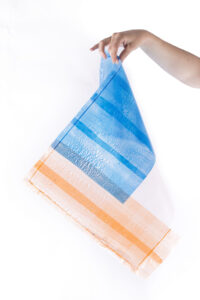
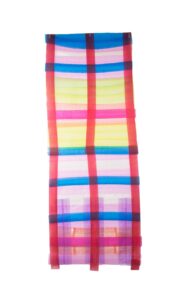




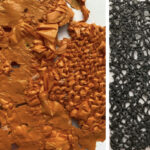
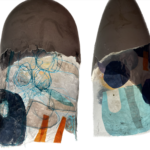
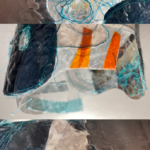


Beautiful blog, Winnie. I love the way you are using images and very much apprecaite the highlighting of another’s work each post. This is great. The only thing I would say is that the black text on the dark grey-brown-black background is a little hard to read! Great to have you on the course though and to read of your experiments with plastic.